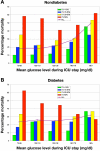Glycemic variability and mortality in critically ill patients: the impact of diabetes
- PMID: 20144383
- PMCID: PMC2787029
- DOI: 10.1177/193229680900300609
Glycemic variability and mortality in critically ill patients: the impact of diabetes
Abstract
Background: Glycemic variability (GV) has recently been associated with mortality in critically ill patients. The impact of diabetes or its absence on GV as a risk factor for mortality is unknown.
Methods: A total of 4084 adult intensive care unit (ICU) patients admitted between October 15, 1999, and June 30, 2009, with at least three central laboratory measurements of venous glucose samples during ICU stay were studied retrospectively. The patients were analyzed according to treatment era and presence or absence of diabetes: 1460 admitted before February 1, 2003, when there was no specific treatment protocol for hyperglycemia ("PRE") and 2624 patients admitted after a glycemic control protocol was instituted ("GC"). 3142 were patients without diabetes ("NON"), and 942 were patients with diabetes ("DM"). The coefficient of variation (CV) [standard deviation (SD)/mean glucose level (MGL)] of each patient was used as a measure of GV. Patients were grouped by MGL (mg/dl) during ICU stay (70-99, 100-119, 120-139, 140-179, and 180+) as well as by CV (<15%, 15-30%, 30-50%, and 50%+).
Results: Patients with diabetes had higher MGL, SD, and CV than did NON (p < .0001 for all comparisons). Mean glucose level was lower among both GC groups compared to their corresponding PRE groups (p < .0001), but CV did not change significantly between eras. Multivariable logistic regression analysis demonstrated that low CV was independently associated with decreased risk of mortality and high CV was independently associated with increased risk of mortality among NON PRE and GC patients, even after exclusion of patients with severe (<40 mg/dl) or moderate (40-59 mg/dl) hypoglycemia. There was no association between CV and mortality among DM using the same multivariable model. Mortality among NON from the entire cohort, with MGL 70-99 mg/dl during ICU stay, was 10.2% for patients with CV < 15% versus 58.3% for those with CV 50%+; for NON with MGL 100-119 mg/dl, corresponding rates were 10.6% and 55.6%.
Conclusions: Low GV during ICU stay was associated with increased survival among NON, and high GV was associated with increased mortality, even after adjustment for severity of illness. There was no independent association of GV with mortality among DM. Attempts to minimize GV may have a significant beneficial impact on outcomes of critically ill patients without diabetes.
Figures
References
-
- Wass CT, Lanier WL. Glucose modulation of ischemic brain injury: review and clinical recommendations. Mayo Clin Proc. 1996;71(8):801–812. - PubMed
-
- Capes SE, Hunt D, Malmberg K, Malmberg K, Pathak P, Gerstein HC. Stress hyperglycemia and prognosis of stroke in nondiabetic and diabetic patients: a systematic overview. Stroke. 2001;32(10):2426–2432. - PubMed
-
- Capes SE, Hunt D, Malmberg K, Gerstein HC. Stress hyper-glycaemia and increased risk of death after myocardial infarction in patients with and without diabetes: a systematic overview. Lancet. 2000;355(9206):773–778. - PubMed
-
- Kosiborod M, Inzucchi SE, Krumholz HM, Xiao L, Jones PG, Fiske S, Masoudi FA, Marso SP, Spertus JA. Glucometrics in patients hospitalized with acute myocardial infarction: defining the optimal outcomes-based measure of risk. Circulation. 2008;117(8):1018–1027. - PubMed
MeSH terms
Substances
LinkOut - more resources
Full Text Sources
Medical
Miscellaneous


